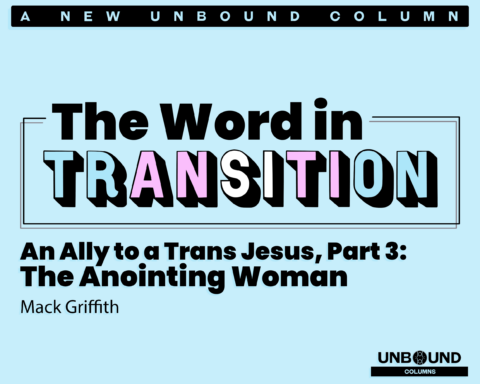Judges 6-8 depict the Gideon cycle of judgeship over the Israelites and unlike many of the judge narratives, Gideon’s story contains large amounts of detail allowing Gideon to undergo significant character development. The Gideon who is called in Judges 6 is timid and insecure, whereas the Gideon who dies in Judges 8 is confident, violent, and idolatrous. Gideon’s confidence shifts between chapter 6 and chapter 8 and somewhere along the way, his character crosses a threshold into toxic masculinity. Transgender men[1] often follow a similar arch to that of Gideon and face the same risk of toxicity. Reading the character of Gideon through a transmasculine lens can expose the causes of toxic trans masculinity and possibly help trans masculine people avoid the same pitfalls and outcomes to which Gideon fell prey.
In chapter 6, Gideon experiences a type of coming out story. Verses 1-10 describe the Midianite oppression of Israel as a result of their wickedness before God, but in verse 11, the story turns to the angel of the Lord who appears under the oak tree at Ophrah. Gideon, the son of Joash, is there hiding from the Midianites by beating wheat in a wine press. The angel of the Lord then greets him with rather odd words, given the circumstances: “The Lord is with you, you mighty warrior” (6:12). This title does not seem to fit the man who is hiding from his oppressors in a wine press, yet the angel of the Lord knows that the title is not about what is presently visible, but about what he can and will become. The Lord then commissions Gideon to be the deliverer of Israel to which Gideon replies, “But sir, how can I deliver Israel? My clan is the weakest in Manasseh, and I am the least in my family” (6:15). In this first encounter, Gideon’s insecurity and lack of confidence prevent him from accepting his identity and becoming the deliverer God has called him to be. At this point, Gideon requests a sign to prove that God is truly calling him and when his offering is consumed in fire, Gideon recognizes the Lord and accepts his calling (6:17-24).
When a trans person realizes they are transgender, they experience a similar period of disbelief, negotiation, and questioning. My first reaction to realizing my trans identity was to laugh at the irony, something I imagine Gideon experienced when the angel called him “mighty warrior”. I told God that I could not be trans because I was from a fundamentalist family and, while I was not a feminine person, I was not hyper-masculine either. Once I overcame my disbelief and when my negotiations with God failed, I looked for signs to verify my transgender identity. Those signs came in the form of gender euphoria when I began binding my chest and trying out new pronouns (he/him/his). Less positive signs included intensified gender dysphoria when I could not bind my chest or when someone used my birthname or feminine terms for me. I was hiding from my identity in the perceived safety of a conservative Christian college, but even there, God found me and called me a man—an ironic title for the eighteen-year-old college student putting on blouses and make-up for teaching field placements. However, when I received that call and the confirmation I asked for, it became clear that I had to accept my identity and take the next step: telling other people.
Once Gideon recognizes the Lord and receives his sign, the Lord gives Gideon his first task—one that would publicly expose Gideon as going against his community’s customs. The Lord tells Gideon to take his father’s bull, use it to pull down the alter of his community’s gods, build an alter to YHWH, and then sacrifice the bull on the alter to YHWH with the wood from the idols. Gideon is willing to perform the task, but because “he was too afraid of his family and the townspeople” (6:27), he chooses to act under the cover of night. Gideon’s fear is not unwarranted since as Susan Niditch writes, it is a “bold act of subversion” that “[challenges]gods and the very world view of those around him.”[2] Though called by God to go against the customs of his community and subvert their expectations, Gideon lacks confidence and courage and rather than boldly ‘outing’ himself in broad daylight, he waits for his community to discover his actions in the morning.
When Gideon’s transgression is discovered, his community is enraged and call for Gideon’s execution (6:28-29). Joash, Gideon’s father, comes to his son’s defense and says that if Baal has taken offense to Gideon’s actions, then Baal can defend himself. Niditch sees this moment as a transformation in the life of Gideon saying that this is the moment when Gideon takes his new identity of leader and deliver and makes it public. She especially emphasizes that like other momentous transformations in the Hebrew Bible, Gideon’s too is marked by the receipt of a “new heroic name,” Jerubbaal.[3] Even after his father defends him and he receives a new name, Gideon is still not fully convinced that he is truly a leader and to assuage these concerns, Gideon humbly tests the waters asking God for two more signs.
After I had come out to myself, I was faced with the terrifying task of coming out to others. Like Gideon, I knew that coming out as transgender to an extremely conservative community was a not only a massive subversion of expectations but also a serious transgression against what my community deemed a god-honoring life. I too chose a less than direct means of coming out, opting to make my identity public online and then wait for the inevitable fall out. My family did not defend me, but I defended myself in the same way that Joash defended Gideon, saying that if God has a problem with my transition and life as my true self then God can be the one to tell me so. It was at that time that I also took a new name and made my true identity public. I did not, however, instantly become confident and comfortable in my masculinity the moment I came out. I was still unsure of what it meant for me to be a man and I still sought reassurance to counteract my insecurity. Like Gideon, I regularly went to God and asked for signs that I was doing the right thing and just as God did for Gideon, I was met with patience, mercy, and affirmation. After Gideon’s calling and coming out in chapter 6, the transformation of Gideon begins in earnest. Mark Biddle notes, “the sequence of events and the inner workings of Gideon’s character they suggest sets the stage for his later surprising transmogrification from a hesitant hero into the virtual opposite.”[4]
At the start of chapter 7, Gideon has come out as the person God has chosen to be the deliverer of Israel and he has made that identity public and undergone an initial transformation and name change. It is time for Gideon to live into his new identity by delivering the Israelites from the Midianites and he does so with the support of his community. God warns Gideon that the credit for the impending victory is the Lord’s saying “The troops with you are too many for me to give the Midianites into their hand. Israel would only take the credit away from me saying, ‘My own hand has delivered me’” (7:2). Gideon is aware that the credit belongs to God and not to Israel and steadily decreases his troops until only three hundred remain (7:7). With God’s initial warning to Gideon about hubris, the narrator foreshadows a shift that is beginning to take place in Gideon. His growing confidence inflates further as he overhears a few enemy soldiers recounting a dream in which a loaf of bread rolls into the Midianite camp and collapses a tent (7:13). A soldier interprets the dream saying, “this is no other than the sword of Gideon son of Joash, a man of Israel; into his hand God has given Midian and the army” (7:14).
At the actual battle, the change in Gideon’s character becomes clear as he gives his army their battle cry, “For the Lord and for Gideon!” (7:18), which the troops alter saying, “A sword for the Lord and for Gideon!” (7:20). According to Biddle, “twice he claims for himself or allows others to attribute to him equal billing with YHWH, as it were: he instructs his special forces at the key moment to yell, “For YHWH and for Gideon!” (v. 18), and, when the moment comes, in fact, they cry out, “A sword for YHWH and for Gideon” (v. 20).”[5]
Up to this point in the narrative, Gideon has been a timid example of humility. Gideon’s story seems like the ideal pattern for transgender men to follow. He is hesitant at first and requires validation as many trans men do when they begin to come to terms with their identities. Gideon navigates his coming out process in his own way and while it may not have been the most direct or bold method, Gideon’s fear to approach his community in broad daylight is a feeling that resonates with many transgender individuals. If the story ended here, Gideon would be a shining example of coming out and coming into one’s own. Unfortunately, Gideon’s success against the Midianites and his mild hubris, of which many of us have been guilty, is not the end of his story. In the following chapters which will be discussed in part 2, Gideon crosses a deadly threshold. His once humble and healthy masculinity becomes toxic as his desire to prove himself and defend his own masculinity leads him to cruelty and violence against not only his enemies, but his own people.
[1] It should be noted that masculine non-binary individuals can also develop unhealthy masculinity, however this article focuses primarily on transgender men because non-binary individuals experience violence as a result of being neither men nor women rather than for not being “man enough.”
[2] Susan Niditch, Judges: A Commentary (Louisville: Westminster John Knox Press, 2008), 89; Niditch, Judges, 91.
[3] Niditch, Judges, 91.
[4] Mark E. Biddle, Reading Judges: A Literary and Theological Commentary, Reading the Old Testament Series (Macon: Smyth & Helwys Pub, 2012), 79.
[5] Biddle, Reading Judges, 92.
Bibliography
Biddle, Mark E. Reading Judges: A Literary and Theological Commentary. Reading the Old Testament Series. Macon: Smyth & Helwys Pub, 2012.
Niditch, Susan. Judges: A Commentary. Louisville: Westminster John Knox Press, 2008.
“It Should Be Noted That Masculine Non-Binary Individuals Can Also Develop Unhealthy Masculinity, However This Article Fo,” n.d.

Mack Griffith (he/him/his) is transgender biblical scholar, poet, and 2021 Master of Theological Studies graduate of Vanderbilt Divinity School. After graduating from Vanderbilt Divinity School, he will go on to complete a Ph.D. in New Testament biblical studies through St. Mary’s University, Twickenham. Mack’s field of interest is transgender biblical studies, and he hopes to progress transgender biblical readings beyond defense of trans identities to readings that offer representation, hope, and empowerment to the transgender community.






Unbound Social